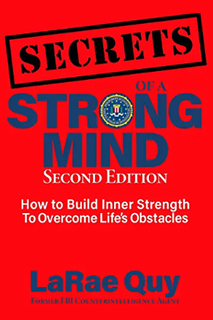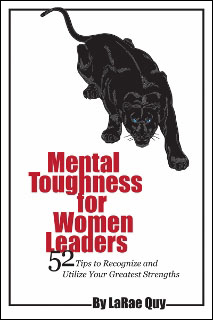When I arrived as a new agent on my squad, I was the only female and the youngest. Everyone was polite, but my caseload was full of dead-end leads that the older and more experienced agents didn’t want to waste their time on.
My desk was at the end farthest from the supervisor, where all new agents were dumped. The agents closest to the throne of leadership were the older and more experienced ones.
The supervisor always stopped and chatted to the older agents, and they would often head out for breakfast together. When a good case arrived on his desk, guess to whom it was assigned? One of his buddies.
At the same time, an undercover operation was launched against one of the targets of an investigation. They were looking for an Undercover Agent (UCA), and I thought that my young age would be an advantage in this situation. I was afraid to suggest that I take the UCA role because I didn’t want to come across as being too aggressive or overly confident. After all, maybe they knew something that I didn’t.
I was afraid, so I kept my mouth shut.
The selected UCA failed to ingratiate himself with the target of the investigation, and the operation closed down.
This is a great quote from Anais Nin: “And the day came when the risk to remain tight in a bud was more painful than the risk it took to blossom.”
That’s how I felt. I could have waited until one of the older agents came up with another idea for an undercover operation, but one day I found my courage. I wasn’t going to let fear stop me. I believed that I had the ability to make a difference in this case. That gave me courage.
I believed that my job mattered and that what I did mattered. That gave me courage.
I’d been side-lined long enough, so I decided to pre-empt another undercover operation by coming up with an idea of my own. One that would require a younger agent to fit into the population we were targeting.
I wrote it up and handed it to my supervisor. He shrugged his shoulders and told me good luck because FBIHQ would be the ones to give it the green light. My budget was too big, and the backstopping needed to protect my identity would require more than the supervisor’s approval.
Lo and behold, FBIHQ loved it! They funded it and authorized me to be the UCA.
Fear of the unknown is nothing new. Physiological changes happen in our body, and we experience an increased heart rate that prepares us for fight or flight. Not everything new or different is a threat to us, but our minds haven’t evolved to fully differentiate between a life-threatening fear and a potential blow to our ego.
This means that anything new to our environment can produce a certain amount of fear. It’s common to have complete confidence in ourselves in one area of our life and melt like a sugar cube in other areas.
Politicians are afraid of falling poll numbers. Bold artists are afraid of negative reviews. Competent leaders are afraid of new challenges in the marketplace. We all have that hollow space that holds fear of the unknown.
Courage and fear are often different sides of the same coin. That’s why to have courage, we must acknowledge our fear. It can take mental toughness to face the things that scare us.
Are you mentally tough? Here is an evidence-based Mental Toughness Assessment
How does one feel the fear and do it anyway? There’s a lot of hack advice about focusing on the positive and ignoring the negative, but all this does is disassociate you from your emotion, which is unhealthy. Contrary to what self-help books proclaim, there is no magical way to summon courage.
My training has led me to believe that while theories are nice, evidence is better.
Decades of research in psychology show that ignoring the negative and only focusing on the positive actually makes you more anxious. Your brain is not stupid. It knows that pretending the negative doesn’t exist won’t make it disappear. Shoving down what you don’t want to acknowledge doesn’t work, either.
Both approaches only produce short-term gains.
You need to examine all of your emotions. When you shine a light on your fear, it does two things:
First, we often realize that the decision or project before us is not as scary as we imagined it to be. The emotional drama queen’s brain tends to spiral up negative emotions, so one of the best things to do is draw a line down the middle of a piece of paper and start writing. On one side, write down all the pros of moving ahead with your decision or project. On the other side, jot down all the cons of moving ahead. Anticipate all reactions, both positive and negative. This will give you a chance to choose how to respond. This is particularly helpful if the decision involves talking to people about a new project or idea. You are not left flat-footed by objections or questions when you anticipate the response.
Second, when you shine a light on fear or anxiety, you give yourself permission to learn more about it. Fear is a strong emotion that should be explored. Study it and become familiar with it but not a slave to it. What were the origins? In what circumstances do you feel this emotion? What is it that scares you? Dissect your fear and get to know it. It can be uncomfortable and even painful, but the more you know about the fear, the better you can find the courage to overcome it.
How To Make It Work For You:
1. Identify the call or challenge that is in front of you. Will it lead to the best version of yourself? Sometimes it takes time to accept the call and what it means to you. Often, to refuse the call is to deny your destiny.
2. Pinpoint when emotional courage is needed. It takes empathy to understand what others may fear as well. Think about a difficult conversation you want to have with someone but haven’t followed through. Why not? Is there something you don’t want to feel? Maybe conflict? The other person’s defensiveness? Their anger? Your anger? Run those conversations through your mind and try to empathize with the other person’s reaction.
3. Claim power over your own life. There is no reason to have courage if you don’t honestly believe that you have power over the way you live your life. Courage is the belief that you can control the outcome of your situation and that you are resolved to make it happen. Remember that there is a dichotomy of control. Some stuff is not in your control: your height, the color of your eyes, the weather, the stock market, the traffic, etc. While it’s not up to you how tall you are, it is up to you to have power.
Do you believe you have the ability to make a difference in your world? Do you believe in yourself? If you don’t believe in yourself, you’ll never have the courage to move forward. You might not be building the foundation of a huge building, but you may be building a stone to help others along the path.
© 2022 LaRae Quy. All rights reserved.
You can follow me on Twitter, Facebook, Instagram, AND LinkedIn
Are you mentally tough? Take this evidence-based, FREE Mental Toughness Assessment
Check out my new online training program at www.SecretsOfAStrongMind.com
Get my new book, “Secrets of a Strong Mind (second edition): How To Build Inner Strength To Overcome Life’s Obstacles”
Author of “Mental Toughness for Women Leaders: 52 Tips To Recognize and Utilize Your Greatest Strengths”




Great points LaRae on building courage! I especially connected with your idea: “Claim power over your own life.” I think sometimes we relinquish our power to difficult people or challenging situations. It’s crazy but we allow our limiting beliefs to prevent us from trying new things that seem way out of our comfort zones. If only we took a chance and claimed our power, we would see our value.
I really appreciate your points made in this post, especially your comment, “to have courage, we must acknowledge our fear”. This is so true for so many to understand, but yet so difficult.
Thank you this was very inspiring